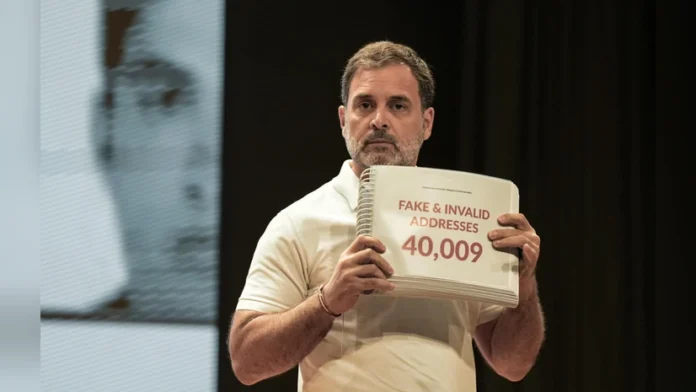1. The Spark: Vote Chori Claims and the “Atom Bomb” Evidence
In early August 2025, Rahul Gandhi, the Leader of Opposition in the Lok Sabha, launched an explosive series of allegations that rocked India’s political discourse. Speaking at a press event and a major rally, Gandhi claimed to wield an “atom bomb”—not a weapon of destruction, but incontrovertible evidence showing how the Election Commission of India (ECI) allegedly colluded with the ruling BJP to facilitate vote manipulation, which he termed “vote chori” (vote theft). These accusations represented his most scathing attack on the electoral process to date.
He referenced startling data from the 2024 Lok Sabha elections, particularly in Karnataka’s Mahadevapura Assembly segment. Gandhi revealed that his team had identified 100,250 allegedly fraudulent votes in that area alone—implying that 1 in 6 votes was tainted.
Simultaneously, he invoked systemic anomalies seen in Maharashtra, where the INDIA alliance had triumphed in the Lok Sabha elections, but the BJP swept the Assembly polls just four months later. The Congress suggested that over 1 crore “new voters”, who weren’t part of the earlier rolls, had turned up—and the majority apparently cast their ballots for the BJP—a glaring irregularity that Gandhi described as vote theft and a betrayal of democratic principles.
2. Institution Under Fire: Gandhi Targets the EC’s Transparency
Gandhi didn’t limit his criticism to raw data alone. He alleged that the Election Commission withheld critical digital records—such as voter lists in machine-readable form—and systematically erased CCTV footage that could corroborate claims of wrongdoing. These actions, he argued, amounted to destroying evidence and eroding democratic foundations. He demanded access to 10–15 years of voter data and polling station recordings. Without them, he asserted, the EC was complicit in “institutionalizing” fraud.
In addition, Gandhi alleged that EC websites in key states—Madhya Pradesh, Rajasthan, and Bihar—were shut down at crucial moments, suggesting these closures were deliberately timed to inhibit public scrutiny and prevent manipulation of voter records from being exposed.
3. The Affidavit Showdown and Oath of the Constitution
Responding to the EC’s demand for an affidavit, Rahul Gandhi fired back: he had already sworn the highest oath—before the Constitution itself in Parliament. Why demand another oath? He questioned the necessity of such formalities when evidence had already been laid bare. At his “Vote Adhikar” rally in Bengaluru, he famously held aloft the Constitution, declaring, “We have protected the Constitution … its voices echo from Ambedkar ji, Gandhi, Nehru, Patel, Basavanna, Narayana Guru, Phule ji.” He framed his confrontation not as a political one, but as a defense of constitutional values.
4. Mass Mobilization: Protests and Arrests
Rahul Gandhi and the INDIA bloc didn’t stop at rhetoric. On August 11, 2025, they organized a march from Parliament to the EC headquarters, with Gandhi, Priyanka Gandhi Vadra, Shashi Tharoor, and others participating. Though briefed to hostile reception and briefly detained, the protest was loud and symbolic—demanding integrity and the sanctity of “one person, one vote.” Gandhi reiterated that his actions were meant to safeguard the Constitution, not dismantle it.
5. Institutional Backlash and Political Pushback
As expected, the BJP swiftly responded. Union leaders labeled Gandhi’s allegations as baseless, accusing him of deliberately undermining constitutional institutions. In states like Madhya Pradesh, BJP-aligned officials derided Gandhi’s claims, with some calling them reflective of an “urban Naxalite mindset.” In contrast, Congress figures like Kamal Nath hailed Gandhi’s claims as courageous and timely, underscoring the need for electoral transparency.
Support also came from allies—Shashi Tharoor publicly backed Gandhi’s call for accountability, urging the EC to focus on substance rather than procedural formalities. Meanwhile, the Chandigarh unit demanded a public explanation from the EC, citing Gandhi’s exposé as evidence of bias in the 2024 polls.
6. Constitutional Stakes: The Broader Narrative
Rahul Gandhi framed this controversy not merely as political posturing, but as a profound constitutional struggle. When democratic institutions falter, the Constitution must not. He painted the EC’s alleged actions as an assault on democracy itself, where the very document that enshrines rights becomes powerless if voting mechanisms are corrupted. His argument: the Constitution is the weapon of the oppressed—and Congress will defend it at any cost.
7. What Lies Ahead: Implications and Questions
This confrontation raises pressing questions:
- Will the EC release the requested data? Without transparency, political trust continues to erode.
- Will Parliament or courts intervene? The demands for investigations are gaining momentum.
- Is this the beginning of a broader movement? Gandhi’s framing suggests it’s a long struggle for reinvested faith in electoral integrity.
In essence, this isn’t just about data leaks or technicalities—it’s a battle for democratic ethos itself.



